GLEBELANDS EIGHT OP-ED
Glebelands rogue cop and alleged hitman linked to non-profit ‘conflict resolution’ organisation
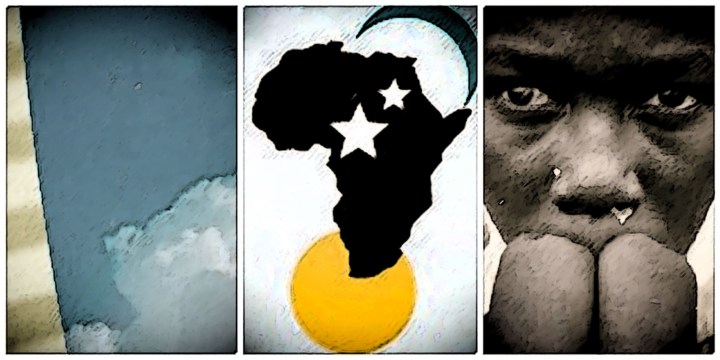
It will be hard to get all the worms back into cans that witnesses have opened in the first three weeks of evidence against the ‘Glebelands Eight’ – an alleged hostel hit squad headed by a rogue detective. The cop and one of his co-accused, a cousin and a neighbour (the last two not charged with any crimes), have also been revealed as founding members of a seemingly bogus non-profit ‘conflict resolution’ organisation that appeared to be active at the height of the hostel killings in 2015.
For more Daily Maverick reports on the Glebelands Eight, read here, here, here and here.
Durban Central detective Bhekukwazi Mdweshu and his cousin Ncomekile Ntshangase, together with Khayelihle Mbuthuma, Vukani Mcobothi, Eugene Wonderboy Hlophe, Mbuyiselwa Mkhize, Mondli Mthethwa and Bongani Mbhele have been charged under common purpose with nine counts of murder, seven of attempted murder and conspiracy to commit murder. Mdweshu is also facing charges of extortion and racketeering, according to the affidavit of Provincial Organised Crime Unit investigating officer Lieutenant Bhekumuzi Sikhakhane, for “forming and leading a criminal syndicate with the purpose to kill persons who resided at Glebelands Hostel”.
Some of the accused are also facing other, unrelated charges, or are already serving sentences for crimes committed in other areas as well as Glebelands.
Evidence so far has focused on Mdweshu’s role in what The Sowetan recently dubbed, “Umlazi’s hit squad”.
Community members – who are testifying in camera due to the high witness kill rate – have averred that in August 2014 Mdweshu and some of his co-accused attempted to assassinate four residents who were seated in a garage at Block R. A witness said he saw Mdweshu firing an automatic rifle in their direction and the detective’s blood was found at the scene after the intended victims fought back. Another witness attested to seeing Mdweshu’s injuries and described measures taken by his associates to get him to the hospital without alerting the police.
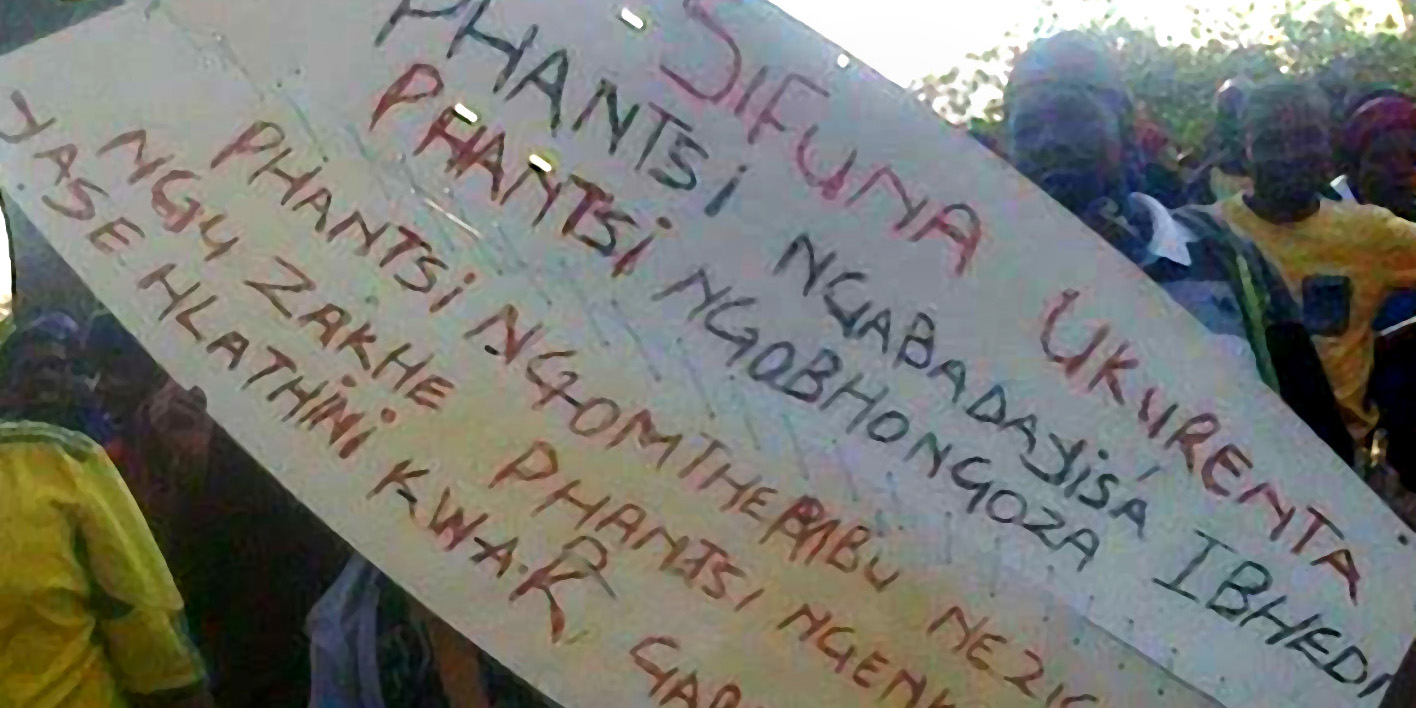
A placard against ‘bed selling’, a hostel rent boycott and Glebelands Block R residents during a protest that a key witness in the Glebelands Eight trial alleges was orchestrated by rogue cop, detective Bhekukwazi Mdweshu (Photo downloaded from ICRF Facebook page)
A key witness, who has been in witness protection since he gave evidence at the Moerane Commission of Inquiry into KZN’s political killings, also implicated Mdweshu in a number of other hostel murders – crimes with which the eight are not (yet) charged.
Some of the accusations levelled against Mdweshu so far are that he:
-
Extorted protection money from residents to bribe fellow police officers to kill dockets in which his associates were the accused, also to buy guns, ammunition and muthi;
-
Ordered hits on individuals perceived as a threat to his power over the community; or those who refused to contribute funds; or potential or actual witnesses to crimes allegedly committed by his associates;
-
Coerced block leaders to submit memoranda of complaint to the police and municipality, implicating other hostel leaders in corrupt activities and demanding their immediate eviction (almost all were subsequently killed);
-
Raised these complaints purportedly on behalf of the community when in fact the grievances were personal;
-
Held meetings with his co-accused and other residents to identify and plan the demise of his targets;
-
Used the SAPS database to plan the hit on Sipho Ndovela – a witness to Siyephu’s murder – who was gunned down at the entrance of the Umlazi Magistrate’s Court in May 2015;
-
Put a price on the head of William Mthembu – a reward for the first hitman who killed Mthembu (Mthembu was assassinated on 12 September 2015);
-
Unlawfully purchased an R5 rifle from a police colleague, the handover of which apparently took place at the old Reunion airport site, as well as an AK-47, a pump-action shotgun and various other weapons for the purpose of wiping out those who opposed him;
-
Described his R5 – allegedly kept in a black bag on which the word “MAN” was embroidered – as “beautiful,” and trained other residents how to use it; and
-
Enjoyed the protection and complicity of a number of other SAPS officers, some of whom evidence suggests, attempted to tamper with crime scene evidence and are likely implicated in at least one murder.
No doubt more will be revealed in the weeks ahead. In the meantime, let us rewind to the height of the carnage in 2015 when more than 30 people were killed, nearly 80% of whom were widely regarded as Mdweshu’s “enemies”.
At the time I was working on a part-time basis for the UKZN Centre for Civil Society (CCS) but spent most of my time at the hostel. Violence monitor and academic Mary de Haas was also helping some of the victims of police torture. Our attempts to get proper investigation into reports of police collusion/direct involvement as well as the use of state-issue firearms – particularly an R5 or similar automatic rifle – in the violence, had drawn considerable flak from senior ANC politicians as well as from the former provincial commissioner, Lieutenant-General Mmamonnye Ngobeni and her spokesperson Colonel Jay Naicker.
In a 2015 response to the Mail & Guardian, Naicker accused De Haas and me of fomenting the conflict purely for publicity purposes in order to generate funds for our purported “organisations” (De Haas and I were in fact self-funded and operating independently. We have yet to receive the apology for these defamatory remarks that we requested from the SAPS).
On 15 August 2015, a Mr Sinegugu Zukulu telephoned the former CCS director, Professor Patrick Bond, on behalf of a Mr Ganyile who was, he said, a member of the Ithuba Conflict Resolution Foundation (ICRF), a non-profit organisation that Zukulu claimed had an “office at Glebelands” and was “working to bring peace to the community”.
Zukulu requested that Bond link up Ganyile with De Haas and me and perhaps other CCS scholars to “partner with” and maybe “mentor” the ICRF with a view to resolving the hostel conflict. Zukulu provided Ganyile’s contact details in a follow-up email.
Ever the cynic and by then intensely suspicious of all unsolicited approaches, I made inquiries about the ICRF. None of the community members with whom I was working had heard of the organisation let alone knew where its office was at Glebelands. However, a former hostel leader who undertook his own investigations assured me that, “they are a bunch of idiots, they are causing trouble and even fighting among themselves who will be director.”
With so many other crises to deal with at the hostel I soon forgot about the ICRF, until much later.
WTF?
A year after the December 2017 arrests of the Glebelands Eight, while Googling media reports of the case, up popped a website belonging to the ICRF. Listed under the organisation’s founding members were Bhekukwazi Louis Mdweshu, his co-accused Ncomekile Ntshangase, another of his relatives, Lwazi Manqamane (who has since been implicated in a witness’s testimony as allegedly complicit in concealing a crime) and a fellow Block 52 resident and private security company employee, Berthwell Limako. Their photographs were included on the page.
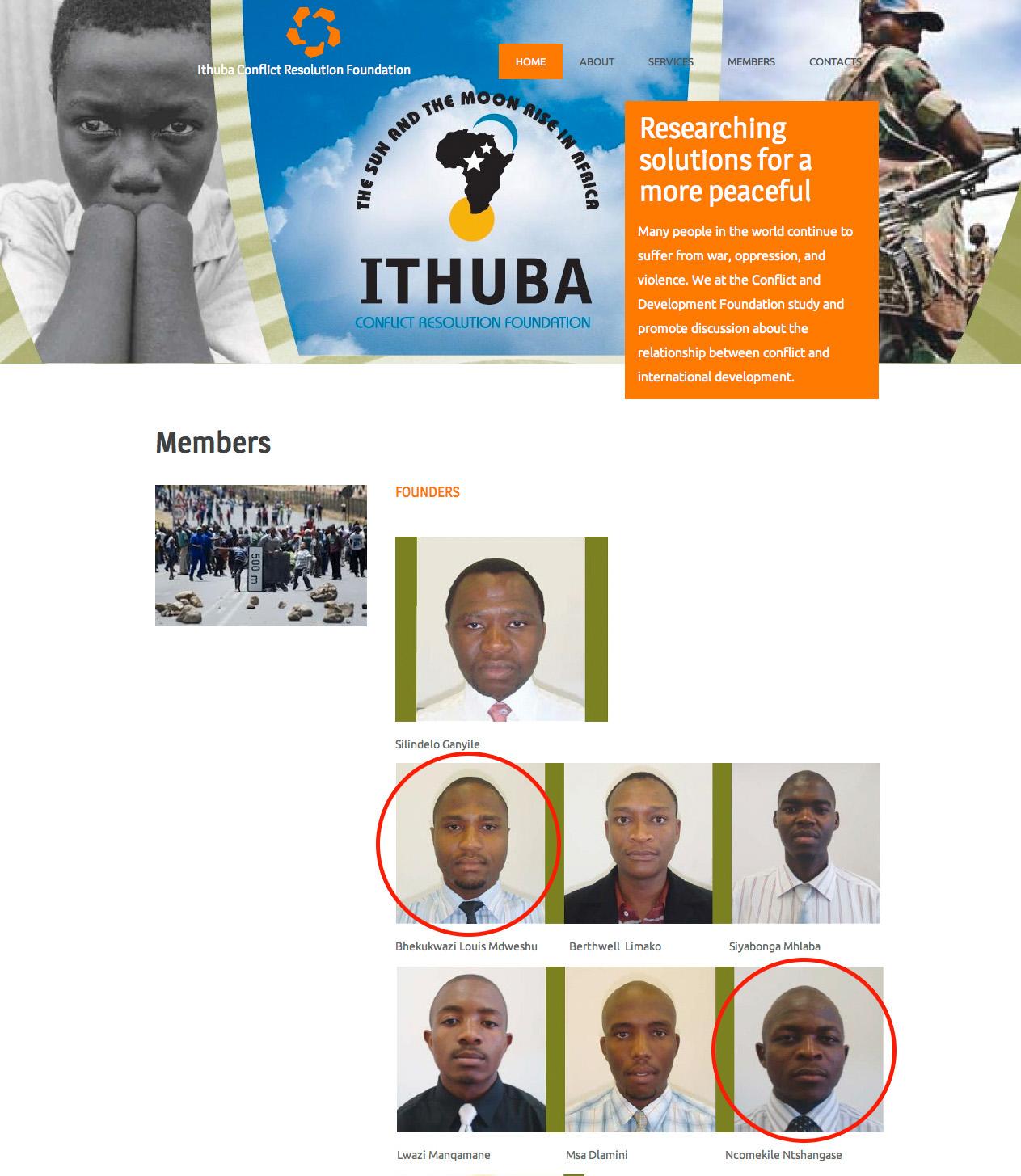
ICRF Founders – Glebelands Eight Accused 1, Durban Central SAPS detective, Bhekukwazi Louis Mdweshu; and Accused 5, Ncomekile Matlale Ntshangase, Mdweshu’s cousin. (screenshot from ICRF website)
One Silindelo Ganyile – presumably the “Mr Ganyile” who had tried to make contact with De Haas and me in 2015 via the CCS – topped the list of founders.
The website, the domain for which appeared to have been registered in 2015, included elements which seemed to have been lifted from other organisation’s sites. The ICRF claimed it was “an independent, non-governmental organisation that supports efforts to prevent political and social violence and to achieve sustainable peace through conflict transformation”.
The ICRF now had my full attention.
According to the Glebelands Eight indictment and testimony heard before court, by the time the organisation reached out to the CCS, two of its founding members had already killed five people and attempted to murder four more using a “beautiful” R5 automatic rifle allegedly purchased from other cops and paid for with funds extorted under duress from poor hostel dwellers.
I read further.
The ICRF’s stated aims and objectives were: “To contribute positively towards realisation of South Africa’s dream entrenched in the principles of Empowerment. To Revive Cultural Values through Workshops, Motivation, Training and Team Building. To resolve Conflict by using approved and reliable methods, thus ensuring a positive outcome with the intention of a Win-Win solution being the goal. (Conciliation).” [sic]
The organisation urged: “If you or people you know are interested in working in partnership with us from your region, please contact us. The children need sponsors and the single mothers need help, too. We also assist other disabled persons. Please help any way you can.” [sic]
According to the Cipro companies listings the ICRF was registered as a non-profit company on 20 May 2008, the same year Mdweshu joined the SAPS. Physical addresses recorded on both Cipro and the ICRF site, although slightly different, appeared to be either for law firms or the offices of the Department of Labour located near the Durban High Court.
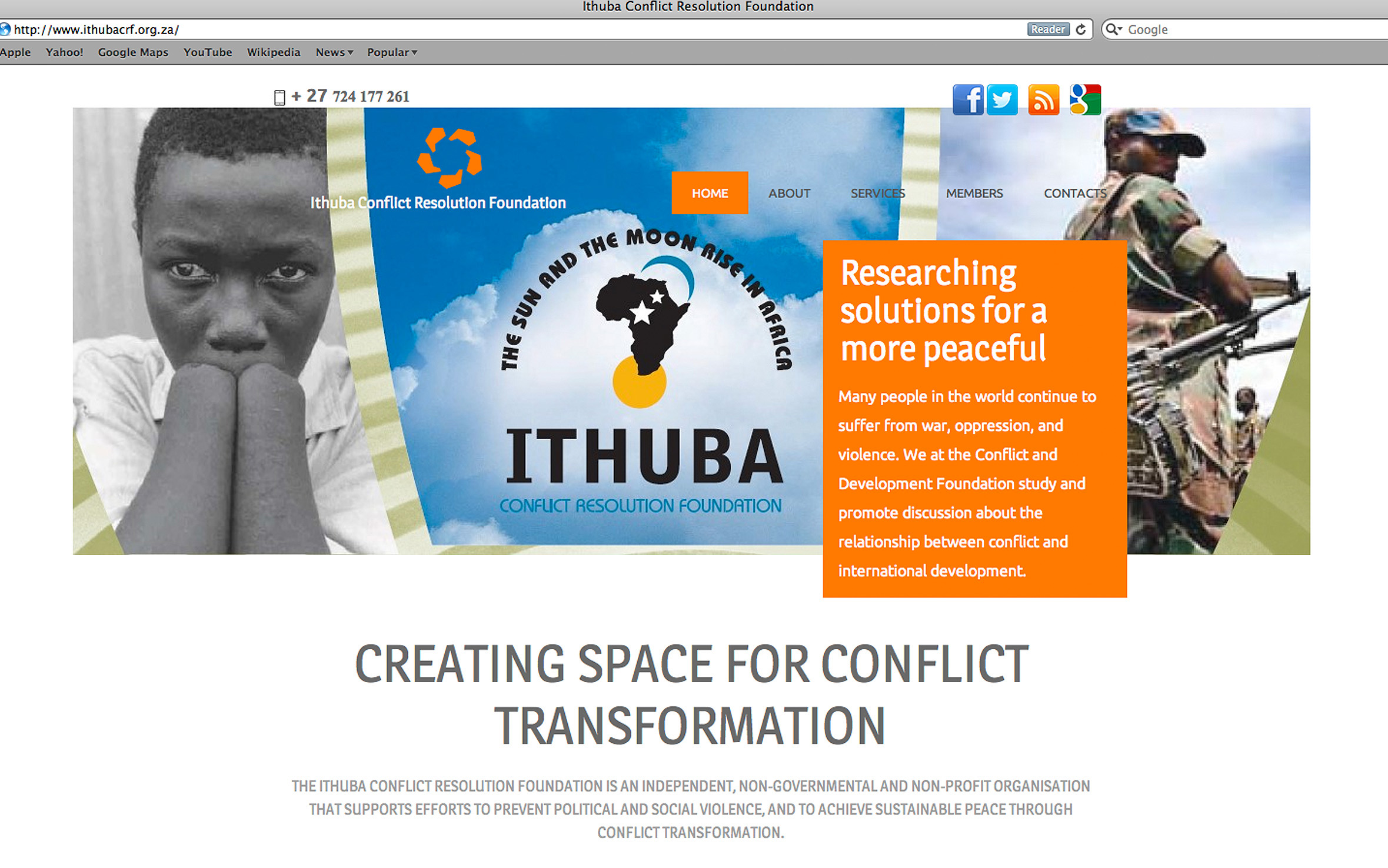
The Ithuba Conflict Resolution Foundation homepage (Screenshot: ICRF website)
Under an ominous heading “Operations Outside South Africa” the ICRF claimed: “We intend to be involved with high powered political elements if we are called to resolved political conflict outside the country. We are now in the process of persuading retired judges to join us in order to form a strong and reliable team. We further intend to involved retired president of the country in future to work with us too under this umbrella.” [sic]
I wondered with what “high powered political elements” the ICRF intended to involve itself beyond our country’s borders? And with which “retired president” [sic] the organisation wished to work? These were scary prospects even if only half of the evidence that has so far been placed before court in the Glebelands Eight trial is found to be correct.
Opaque funding:
Since the arrests in December 2017, there has been much speculation about who was funding Mdweshu and his cousin, Ntshangase’s legal defence. Initially, top criminal defence lawyer, advocate Jimmy Howse had been retained for the accused’s bail application. Howse has in the past defended such politically connected luminaries as Thoshan Panday, Edward Zuma, the Gcaba brothers and more recently, disgraced eThekwini mayor Zandile Gumede – all relatives of, or believed to be close allies of, former president Jacob Zuma. Another senior advocate, Martin Krog, is currently representing Mdweshu and Ntshangase while their co-accused are relying on Legal Aid.
Advocates of this calibre cost a considerable amount of money. It is highly unlikely that Mdweshu, a relatively low ranking officer with only 11 years service and apparently suspended without pay after his arrest, would have earned anywhere near enough to afford such eminent legal counsel. Likewise for Ntshangase, who, prior to his 2011 appointment as a Prasa technician earning (according to his bail application) R18,000 per month, had been an SANDF soldier – a notoriously poorly paid vocation. It is equally unlikely that even the vast sums regularly extorted from the hostel community would be enough to cover legal expenses incurred during such a lengthy and complex trial – similar costs have been known to bankrupt even wealthy businessmen.
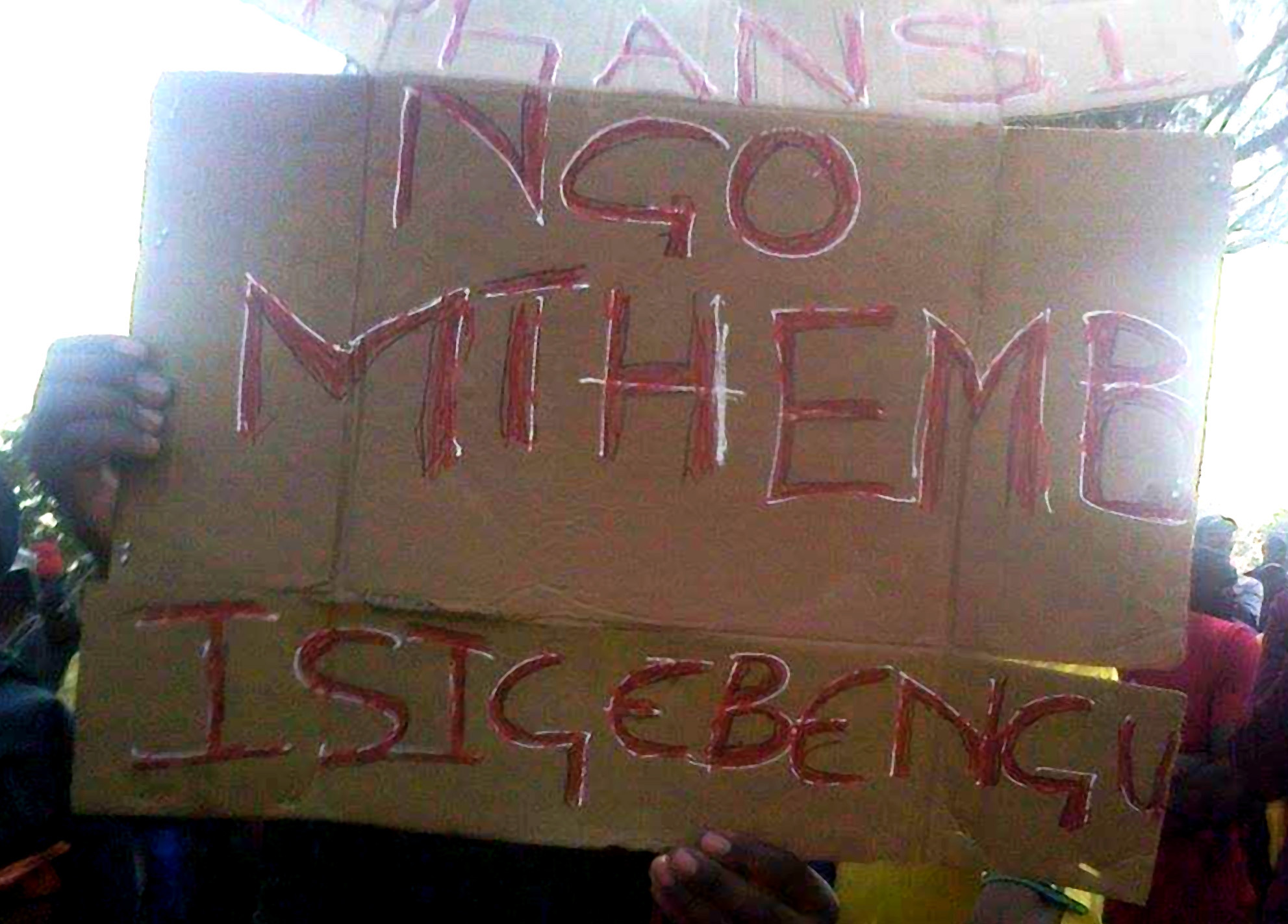
“Down with Mthembu the criminal” – photos and text downloaded from the ICRF Facebook page suggests an admission of guilt by Mdweshu’s associates in the murder of William Mthembu and Thokozani Machi (Photo: ICRF Facebook page)
Community sources claimed that money for legal fees, possibly paid by local politicians, was being channelled via one of Mdweshu’s cousins (and fellow ICRF founder) in order to conceal the funder’s identity. It was rumoured that payments for certain hits could have been laundered in the same way. Shortly before Howse terminated his services – ostensibly due to non-payment – a source allegedly overheard Ntshangase’s brother and Mdweshu’s former roommate claim “________ [a local ward councillor] has stopped paying.”
Non-profit organisations must be audited annually. Yet there is no indication that the ICRF complies with such financial regulations and no financial reports or funders’ information is available online.
So who is funding Mdweshu and Ntshangase and why? And is the “conflict resolution” organisation being used to launder the proceeds of crime or conceal payments from individuals who could be politically exposed if their association with the accused was revealed?
A witness who is currently giving explosive testimony in the Glebelands Eight trial said he only knew of Ithuba Construction, a company he alleged Mdweshu and his family registered specifically to obtain contracts from the eThekwini Municipality. This would have been a contravention of the Public Finances Management Act that prohibits government employees from doing private business with the state. He said the endeavour, however, had been unsuccessful.
Strangely for an NPO, the ICRF has no online presence other than self-generated content. A Twitter account that was opened in December 2018 featured only a few tweets about the 2014 violence and Glebelands protest marches. There was no information about any programmes or “conflict resolution”-related activities in other areas.
A shot in the foot:
But it was the ICRF Facebook page that proved the most illuminating.
Video footage, photographs and a “history” of Glebelands’ conflict were posted in the form of typed and handwritten notes in English and isiZulu. I duly downloaded these and had them translated by an independent, professional translator, then pieced them together with the English text. What emerged was a disjointed (in some parts the handwriting was illegible) but disturbing narrative of hatred, intolerance, part-truths and misinformation, prejudice and intra-party conflict reaching back to the early 1990s.
The author(s), who is/are not identified, evidently grew up at Glebelands and mentions a murdered father. Clearly a supporter of ANC ward 76 councillor, Robert Mzobe, a deep loathing for hostel dwellers association – Ubunye bamaHostela – leader Vusani Zweni, and community strongman and ANC stalwart the late William Mthembu, runs like a vein of poison throughout the narrative which is overshadowed by the anything but even hand of the police.
Revealingly, the narrative documents grievances against hostel residents who have since either been assassinated, violently evicted or seriously injured during attempts on their lives. While the narrator tries to justify their deaths as self-defence, details regarding these incidents already in the public domain suggest a different picture.
But most incriminating of all, among the photographs posted on the ICRF Facebook page is the picture of a placard born aloft during one of the protest marches that, according to a key trial witness, were orchestrated by Mdweshu himself against hostel leaders who threatened his power over the community. The placard reads “Phansi ngo Mthembu isigebengu” (down with Mthembu the criminal), while the accompanying text states: “…I say the Lord will forgive my brothers who killed Mthembu and a member of his gang” (a reference to the 12 September 2015 assassination of William Mthembu and his friend Thokozani Machi at a Montclair shopping centre).
Although the faceless Facebook narrator does his best to implicate Zweni in the 2016 murder of ANC PR councilor Zodwa Sibiya, Sikhakhane told the court Sibiya was killed because she was thought to have been a witness to the Mthembu/Machi assassinations at the Montclair shopping centre – counts 13 and 14 of the indictment. According to Sikhakhane, although Mdweshu and his co-accused are not charged with Sibiya’s murder, ballistics tests linked the Montclair and Sibiya killings. However, it was since revealed that although Sibiya was present at the Mthembu/Machi murder scene, she did not, in fact, see the perpetrators and was likely thus killed in vain.
In a letter dated 13 January 2019 that was sent to police minister Bheki Cele, national commissioner General Khehla Sithole, former acting provincial commissioner Lieutenant-General Nhlanhla Mkhwanazi and others in senior SAPS management, I requested investigation into the ICRF’s activities, particularly whether the organisation was perhaps being used as a front to launder hit money, the seemingly irregular involvement of a police officer in a registered non-profit company, and in terms of financial compliance.
I did not receive a response. Some months later I noticed the ICRF Facebook page had been removed.
The Glebelands Eight appear to be basing their defence on the assertion that their arrests were motivated solely by undue pressure having allegedly been brought to bear on the police by their enemies – the so-called “opposing faction” – and other “biased” parties such as De Haas and me, the Right2Know Campaign, individuals from the Durban branch of Amnesty International, and some religious leaders who tried over the years to assist or have shown solidarity with the violence victims, as well as the press and the former public protector, Thuli Madonsela.
It has taken more than five years and untold effort to bring these eight to trial. During this time more than 130 bodies have piled up, countless lives have been shattered and families destroyed by the violence. The rule of law, democratic principles and the community’s constitutional rights have been undermined, eroded or suspended. Clearly, more people may have survived had considerably more pressure been brought to bear on the SAPS to act sooner and more effectively to quell the violence.
We do not know what roles Zukulu, Ganyile or any of the other ICRF members played in Mdweshu’s “conflict resolution” organisation – the website provides no detail. We also do not know to what extent – if any – its other members knew of the crimes with which the Glebelands Eight have since been charged. Although by the time it made contact with the CCS, allegations of police involvement had been widely reported by the media, especially after Sipho Ndovela’s shocking murder at the Umlazi Magistrate’s Court while supposedly under police protection.
We also do not know if the organisation is still active, if it had or still has a bank account, if it received or disbursed funds and if any of its members benefited personally in any way from the operations of the ICRF – all of which we had requested police to investigate. But, given the body count and accusations of “bias” against De Haas and me made by some of the accused and their associates and police protectors, I am pretty certain that any engagement with the ICRF and its founding members who have since been charged with multiple murders would not have involved much talk of peace.
In the meantime, as the Glebelands Eight trial unfolds, we are still awaiting a response from the police regarding the investigation we requested into Mdweshu’s non-profit “conflict resolution” organisation and what seemed to be the admission of guilt that appeared on its Facebook page.
Tick-tock… DM
Vanessa Burger is an independent community activist for human rights and social justice.


















 Become an Insider
Become an Insider